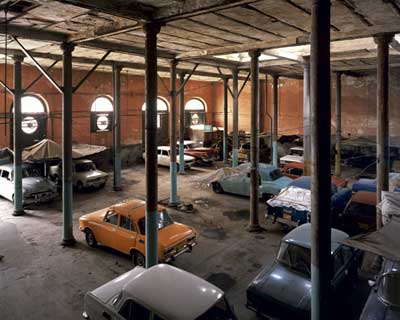 Print Shop / Auto Shop, Habana Vieja, 2004 C-Print mounted on 1/4 inch honeycomb aluminum, 31 x 38 3/4 inches; 78.7 x 98.4 cm Stan Douglas Cuba David Zwirner will present an exhibition of new photographs by the Canadian artist, Stan Douglas, entitled "Cuba". This will be the artist's seventh solo exhibition at the gallery. Rather than adopting the nostalgic approach most often used when photographing Cuba, Douglas depicts living, social spaces in the last instance of what was once called the Second World in North America. The Cuba photographs call to mind Douglas' well-known photographic exploration of the city of Detroit (from 1998), both as a symbol of capitalism, as well as a symbol of twentieth-century urban failures and aspirations. In this new body of work, Douglas has photographed buildings and places that demonstrate how the original intended use of these structures have changed with the course of history. In the thirty-three Cuba photographs, former banks are being utilized as parking lots and cafeterias; a church is converted into a concert hall; a cinema a carpentry shop; and a convent as a school. With "Print Shop / Auto Shop, Habana Vieja", Douglas depicts a former printing house, which was forced to close in 1989, during the Special Period, when supplies became scarce. Now it is used primarily as a parking lot and auto repair shop. Other images such as "Focsa Apartment (Vedado)" and "Barbacoa, Vedado" focus on the creative ways in which people divide their homes to create new living areas for their family. "Beach Resort / Cultural Center, Tarara", chronicles an interesting history of how a former beach resort became a study and recreation center for students after the Revolution. Within the photograph, the scrawled graffiti on the walls bears witness to the foreign children who were later housed there while recovering from radiation poisoning afflicted on them at Chernobyl. Pre-revolutionary beach houses, visible in the distance, looted during the Special Period, are now being renovated to house visiting foreign businessmen. Any revolution is the repurposing of a society. These photographs reveal how the utopian impulse of the Cuban Revolution transformed the original function of the locations in Havana and other cities, while highlighting the influence of reality upon idealism. Rapid changes took place but some were not fullyrealized. The photographs reveal small narratives - personal histories and everyday experiences - hidden within a larger political context. The conflation of all these details are evident in the architecture; through the accretion of usage and meanings, which reflects for Douglas the repurposed use of these structures in Cuba - an incomplete dialectic. Exhibition:October 22 - November 20, 2004 Gallery Hours: Tue-Sat 10am - 6pm David Zwirner Gallery 525 West 19th Street (between 10th Avenue and West Street) USA-New York, NY 10011 Telephone +1 212 727 20 70 Fax +1 212 727 20 72 Email info@davidzwirner.com www.davidzwirner.com |